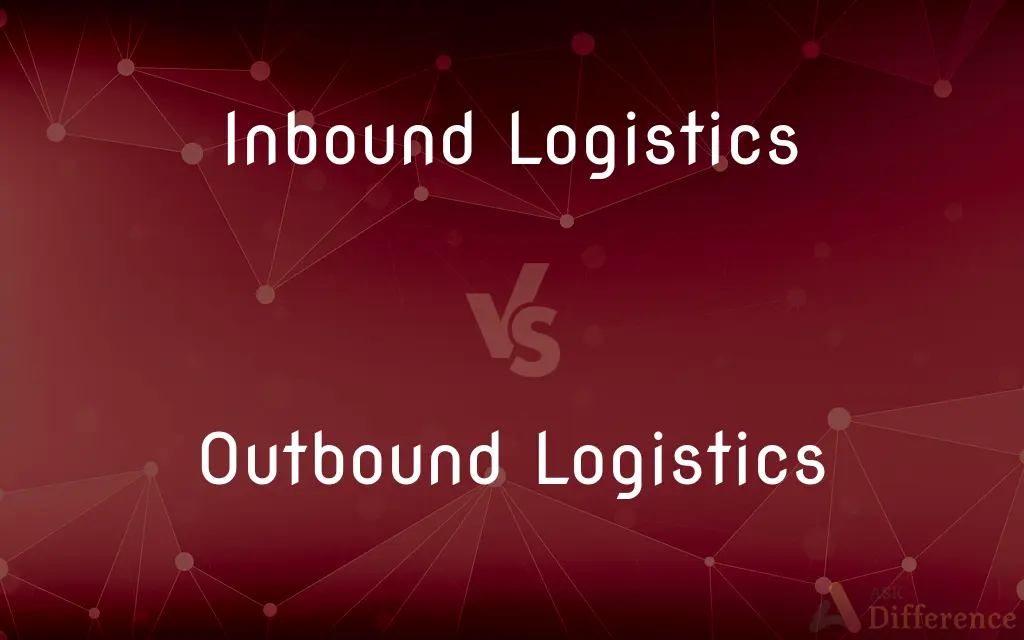Inbound Logistics vs. Outbound Logistics — What's the Difference?
By Tayyaba Rehman — Published on November 13, 2023
Inbound Logistics focuses on the transport, storage, and delivery of goods coming into a business. Outbound Logistics involves the processes of storing, transporting, and distributing goods to customers.

Difference Between Inbound Logistics and Outbound Logistics
Table of Contents
ADVERTISEMENT
Key Differences
Inbound Logistics primarily concerns itself with the transportation and storage of incoming goods and materials. On the other hand, Outbound Logistics is primarily involved in ensuring that finished goods reach the customer efficiently and effectively.
Inbound Logistics focuses on developing efficient strategies to manage and optimize internal and external operations dealing with incoming goods. Outbound Logistics, conversely, lays its focus on improving and ensuring that goods are distributed to the end customer proficiently.
Inbound Logistics encompasses activities such as procurement, storage, and transportation of raw materials to a business. Outbound Logistics, contrastingly, manages the transportation, warehousing, and distribution of finished goods to consumers.
Inbound Logistics often deals with supplier relationships, strategic sourcing, and material handling. Outbound Logistics, alternatively, takes care of customer service, order fulfillment, and the coordination of distribution networks.
Inbound Logistics is largely influenced by supplier lead times, shipping reliability, and inventory management. Whereas, Outbound Logistics typically revolves around order accuracy, delivery speed, and customer satisfaction.
ADVERTISEMENT
Comparison Chart
Primary Focus
Handling, storing, and transporting incoming goods
Managing the flow of finished goods to end customers
Key Activities
Material procurement, transportation, and warehousing
Order fulfillment, distribution, and customer service
Relationship
Deals with suppliers and manufacturers
Concerns itself with distributors and customers
Importance
Ensures that materials are available for production
Ensures that customers receive their products timely
Risk & Challenge
Supplier reliability, material quality, and shipping delays
Order accuracy, delivery timeliness, and return management
Compare with Definitions
Inbound Logistics
Inbound Logistics addresses the strategic planning related to inventory management and storage solutions.
Through predictive analysis, inbound logistics can forecast demand and adjust inventory levels accordingly.
Outbound Logistics
Outbound Logistics navigates through the complexities of delivering goods to varied geographical locations.
The company expanded its outbound logistics network to cater to emerging markets.
Inbound Logistics
Inbound Logistics encompasses activities related to the storage and management of incoming goods.
The company optimized its inbound logistics by introducing an automated warehousing system.
Outbound Logistics
Outbound Logistics includes activities like order fulfillment, warehousing, and customer service.
The firm prioritized improving its outbound logistics to enhance customer satisfaction.
Inbound Logistics
Inbound Logistics concerns the relationships and negotiations with suppliers of raw materials.
A break in inbound logistics can lead to production halts due to lack of materials.
Outbound Logistics
Outbound Logistics manages the storage, transportation, and distribution of finished goods.
Their outbound logistics team ensures timely delivery of products to global customers.
Inbound Logistics
Inbound Logistics seeks to manage and mitigate risks associated with the transportation of raw materials.
The logistics manager developed a new inbound logistics strategy to handle customs clearance more effectively.
Outbound Logistics
Outbound Logistics entails the final stages of an operational process, moving goods to their end users.
Efficient outbound logistics is fundamental for maintaining a positive brand reputation among consumers.
Inbound Logistics
Inbound Logistics involves the procurement and transportation of raw materials to a business.
Efficient inbound logistics are crucial for maintaining consistent production cycles.
Outbound Logistics
Outbound Logistics focuses on ensuring that goods are delivered to customers in a timely manner.
A bottleneck in outbound logistics can result in delayed order deliveries and disgruntled customers.
Share Your Discovery

Previous Comparison
Molar Volume vs. Partial Molar Volume
Next Comparison
SsRNA vs. DsRNAAuthor Spotlight
Written by
Tayyaba RehmanTayyaba Rehman is a distinguished writer, currently serving as a primary contributor to askdifference.com. As a researcher in semantics and etymology, Tayyaba's passion for the complexity of languages and their distinctions has found a perfect home on the platform. Tayyaba delves into the intricacies of language, distinguishing between commonly confused words and phrases, thereby providing clarity for readers worldwide.












































